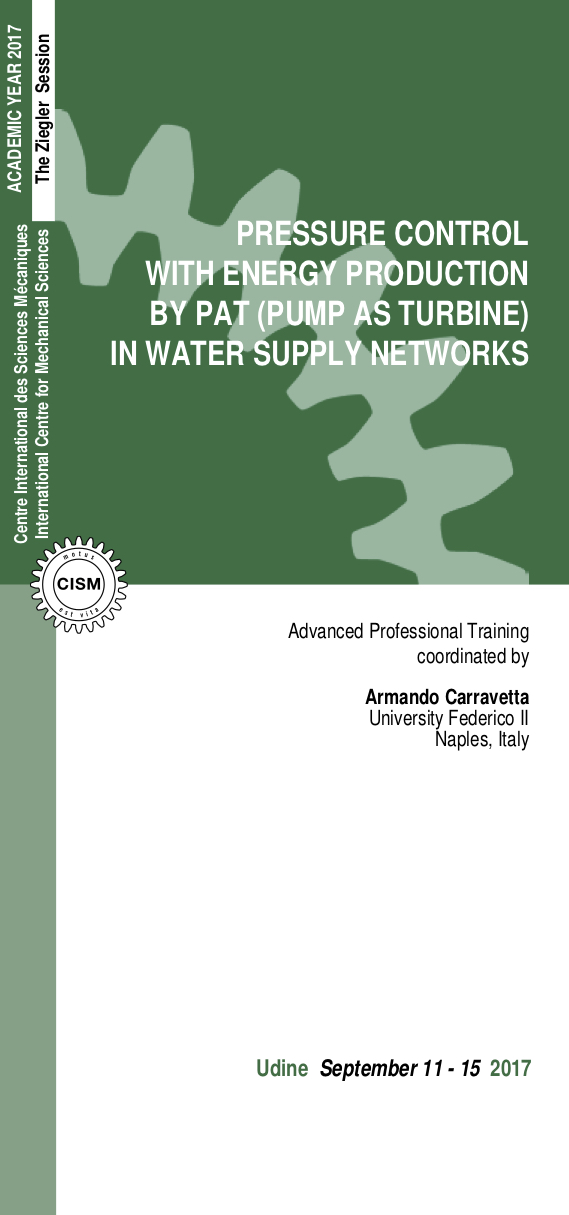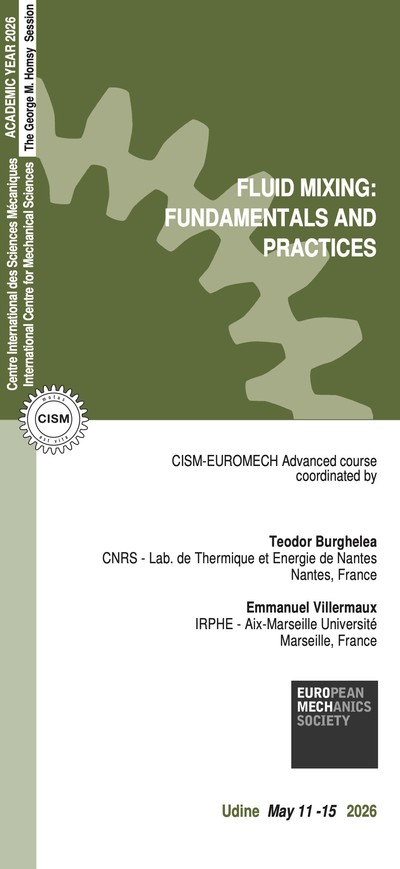Pressure reduction in water supply networks is one of the key topics in hydraulic engineering. The benefits of pressure control are the containment of water leakages, reduced stress for pipelines and waterworks, and a better energy efficiency in water transportation. Pressure Reducing Valves (PRVs) are used to dissipate hydraulic energy and reduce pressure to the required value. The installation of micro and pico hydro power plants in substitution of PRVs could recover part of this energy. PATs are commercial pumps used in reverse mode to generate energy. These devices are very reliable and inexpensive. The coordinator and the lecturers have performed extensive research activities on reverse pumps, covering the mechanical conditions, the design criteria for water supply networks, the mechanical reliability of the equipment, and the system life cycle. The course is designed for advanced graduate students and for postdoctoral researchers across several engineering disciplines (e.g., Civil, Mechanical, Electrical), to provide participants with the tools and techniques to identify potential sites for PATs, to select the most reliable pump to be used at each site, to determine the best regulation mode for the power plant, and to address the life cycle performance of the system. The followings paragraphs summarize the broad subtopic breakdown introduced by the course: PAT Theory The complete theory of pump working in reverse mode will be developed. A summary of the existing methodologies for pump selection to be used as turbines will be given. Lectures on PAT theory will be focused both on the PAT operating conditions, and on the industrial aspects for PAT design improvement. Power plant location in water networks The potentiality of small hydro power plant for pressure control in water supply networks will be fully analyzed. All aspects involved in power plant locations and the optimization of water network management will be considered, including energy production, reduction of water leakage through improved network control, and water network protection in case of power plant failure. Power plant regulation modes In water supply networks, PATs work under variable operating conditions for the daily and space variability of flow rate and available pressure head drop. The existing methods for PAT regulation will be explained and the objective functions in power plant design will be described. Economic and environmental evaluation, resource assessment The reduction of energy consumption for a sustainable use of natural resources is a real global challenge. The income from energy production is only one of the benefits of PAT diffusion. A methodology for the economic and environmental evaluation, and the resources assessment of the proposed technology will be provided. Reliability and life cycle As an effect of the variability of working conditions, the PAT could operate far from the machine’s best efficiency point, and many components could work with larger stress than in pump mode. The presence of suspended sediments could further affect the PAT life cycle. PAT reliability and its effect on power plant design will be fully analyzed.
Carravetta, A., Del Giudice, G., Fecarotta, O., Ramos, H.M. (2012) Energy Production in Water Distribution Networks: A PAT Design Strategy. Water Resources Management, 26 (13), 3947-3959. Fecarotta, O., Carravetta, A., Ramos, H.M., Martino, R. (2016) An improved affinity model to enhance variable operating strategy for pumps used as turbines. Journal of Hydraulic Research, 54 (3), 332-341. Carravetta, A., Fecarotta, O., Sinagra, M., Tucciarelli, T. (2014) Cost-benefit analysis for hydropower production in water distribution networks by a pump as turbine. Journal of Water Resources Planning and Management, 140 (6). Gallagher, J., Harris, I.M., Packwood, A.J., McNabola, A & Williams, A.P. (2015). A strategic assessment of micro-hydropower in the UK and Irish water industry: identifying technical and economic constraints. Renewable Energy, 81 (0), 808-815. Gallagher, J., Styles, D., McNabola, A., Williams, A.P. (2015). Making green technology greener: achieving a balance between carbon and resource savings through ecodesign in hydropower systems. Resources, Conservation and Recycling 105, Part A, 11-17. Gallagher, J., Styles D., McNabola, A. & Williams, A.P. (2015). Life cycle environmental balance and greenhouse gas mitigation potential of micro-hydropower energy recovery in the water industry. Journal of Cleaner Production, 99, 152-159. Yang G S., Derakhshan S., Kong F., 2012. Theoretical, numerical and experimental prediction of pump as turbine performance. Renewable Energy, 48, 507-513. Derakhshan S., Nourbakhsh A., 2008. Experimental study of characteristic curves of centrifugal pumps working as turbines in different specific speeds. Experimental Thermal and Fluid Science 32, 800-807.
Armando Carravetta (None)
7 lectures will introduce the peculiarities of mini to pico hydro power plant and the differences that exist between energy recovery in pressurized or free surface water streams. With reference to pressurized water supply networks, and, in particular, to water distribution in urban and irrigation contexts, a complete analysis of PAT regulation modes will be given with the main design strategies.John Gallagher (None)
4 lectures will introduce life cycle assessment: its approach; benefits and considerations of life cycle thinking in energy recovery product design; present eco-design and circular economy concepts in the context of the water-energy nexus, and how they can drive energy recovery; and an examination of the life cycle performance of PAT systems as modular, easy-to-install and low cost solutions for energy recovery.Stefano Malavasi (None)
4 lectures will examine mechanical PAT reliability, representing a key element in the pump choice. Additional problems affecting the reliability of pumps working in inverse mode emerge form shaft and case corrosion and from cavitation. The limited number of PAT applications when compared to standard pump applications could increase the uncertainty of the effects of external loads on PAT reliability.Aonghus McNabola (None)
6 lectures will address the potential of PAT based hydro power plants in the framework of EC directives for the reduction of energy use and for a sustainable use of natural resources. A methodology for the economic and environmental evaluation and the resources assessment of the proposed technology will be provided.Helena M. Ramos (None)
7 lectures will focus on the optimal location of hydro power plants in water supply networks and on the effects of hydro power on the network management. Pressure control in water supply networks, valves maneuvers and hydro power plants operation, system protection and water network safety will be analyzed with an integrated approach.Tullio Tucciarelli (None)
7 lectures will present the complete mechanical theory of pump used in inverse mode: characteristic and performance PAT curves; affinity laws; one dimensional methods for predicting PAT performance from pump behavior; and potential errors coming form one-dimensional methods. Industrial aspects for PAT design improvement will be discussed on the basis of results coming from computational fluid dynamics and experiments.The registration fee is 575.00 Euro + VAT taxes*, where applicable (bank charges are not included). The registration fee includes a complimentary bag, four fixed menu buffet lunches (on Friday upon request), hot beverages, downloadable lecture notes and wi-fi internet access. Applicants must apply at least one month before the beginning of the course. Application forms should be sent on-line through our web site: http://www.cism.it. A message of confirmation will be sent to accepted participants. If you need assistance for registration please contact our secretariat. Applicants may cancel their course registration and receive a full refund by notifying CISM Secretariat in writing (by email) no later than two weeks prior to the start of the course. If cancellation occurs less than two weeks prior to the start of the course, a Euro 50.00 handling fee will be charged. Incorrect payments are subject to Euro 50.00 handling fee. A limited number of participants from universities and research centres who are not supported by their own institutions can be offered board and/or lodging in a reasonably priced hotel or student dormitory, if available. Requests should be sent to CISM Secretariat byJuly 11, 2017 along with the applicant's curriculum and a letter of recommendation by the head of the department or a supervisor confirming that the institute cannot provide funding. Preference will be given to applicants from countries that sponsor CISM. Information about travel and accommodation is available on our web site, or can be mailed upon request.
* Italian VAT is 22%.





